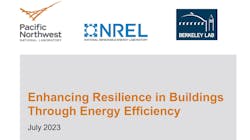Study: Updating Building Energy Codes Can Save Many Lives
PRESS RELEASE
Washington DC, July 18, 2023 -- As heat alerts affected nearly 110 million people, a third of the U.S. population across 15 states, the U.S. Department of Energy (DOE) published a new report on July 13 called "Enhancing Resilience in Buildings Through Energy Efficiency."
The report – which followed a study by a team of energy experts from DOE’s Building Energy Codes Program, Pacific Northwest National Laboratory, National Renewable Energy Laboratory, and Lawrence Berkeley National Laboratory – outlines the value for states and communities that adopt the 2021 International Energy Conservation Code® (IECC) to enhance resilience in response to more frequent and intense extreme weather events attributed to a changing climate.
Findings underscore the impact of the 2021 IECC in protecting occupants from extreme temperatures due to power outages associated with hazard events.
The report’s findings serve as a clarion call for policymakers to adopt the IECC. The IECC’s requirements:
- Improve envelope efficiency in buildings to permit occupants to shelter in place safely for more than four days during a disaster-induced power outage coupled with extreme heat or cold;
- Extend habitability by as much as 120% during extreme cold and 140% during extreme heat and reduce deaths by up to 80% during extreme heat and 30% in extreme cold;
- Provide, for new single-family buildings, benefit-cost ratios from 2 times to over 6 times, making a strong financial argument for adoption.
For additional information on the report and the Code Councils’ continued advocacy for building resiliency, visit www.iccsafe.org/energy and www.energycodes.gov/energy-resilience.
About the International Code Council
The International Code Council is the leading global source of model codes and standards and building safety solutions. Code Council codes, standards and solutions are used to ensure safe, affordable, and sustainable communities and buildings worldwide. Visit www.iccsafe.org/advocacy to learn more.
